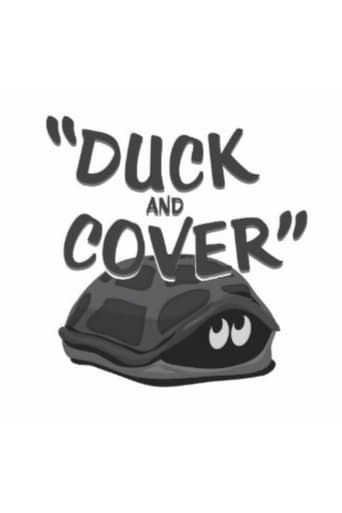Lancoor
A very feeble attempt at affirmatie action
Dynamixor
The performances transcend the film's tropes, grounding it in characters that feel more complete than this subgenre often produces.
Grimossfer
Clever and entertaining enough to recommend even to members of the 1%
Philippa
All of these films share one commonality, that being a kind of emotional center that humanizes a cast of monsters.
atlasmb
I'm sure this purportedly educational film seems foolish and funny from the 21st century viewpoint. Aimed at children, "Duck and Cover" was apropos for its time, when the public was mostly ignorant of the real risks of nuclear warfare, but very afraid of its implications--the way it changed one's view of the world and personal safety, in general.It would be difficult to ascertain if the film accomplished what it set out to do--to give children (and their parents) a sense of security in a more dangerous world. Or did it actually make life seem scarier and more uncertain with its warning about "the bright flash" that might interrupt a beautiful day, without prior alarm, from some unseen, ominous and omnipresent source?Having been a child during that era--and the Cuban missile crisis--I can verify that there was a toll exacted by the constant barrage of warnings about the unspeakable horrors that might befall American citizens at the hands of an evil, godless entity. Thanks, government, for demonizing an entire population and producing such ridiculous garbage as "Duck and Cover".The film clearly has another agenda--one that pervades almost all government-produced films: legitimizing those in authority. The children who view the film are told "We must obey the civil defense worker". And more than once, it tells kids to ask "older people" in the event of an atomic emergency. Images remind the student viewer that teachers are in charge in the classroom, a message I am sure all educators appreciated.This film is an interesting artifact from a "simpler" time--simpler in the sense that the average American citizen rarely questioned authority. I think the average congressman in 1952 knew little more than his constituents about the effects of nuclear weapons. The naivete that pervades the film is authentic.
mshaw61
African-Americans are not discriminated against, mom doesn't want to work, she wants to bake in the kitchen all day until she can attend to father when he gets home from work, there is no pain or suffering in the world and: Yes! You too can survive a nuclear blast just by following the instructions to "Duck and Cover"! This short little film is an incredibly insightful look into life in America in the 1950s (without setting out to do that, of course). Problems didn't exist because the government said they didn't exist. What is incredible in the 21st Century is that, for the most part, Americans really believed this. Maybe the 1950s were a product of those that survived the horrors of World War II. Maybe they invented the "perfect" 1950s to hide the pain from what they experienced in the Pacific and in Europe during WW II. In any case, if you want a short encapsulated view of the surreal life in America in the 1950s, watch this little gem. This should be required viewing for any course about life in post-WW II America.
Lee Eisenberg
In the 21st century, when we know that a nuclear blast would wipe out everything, "Duck and Cover" seems laughable at best. And believe you me, it IS laughable. Made at the height of the Cold War/Red Scare/Nuclear Scare, it reminds wholesome American schoolchildren what to do if a nuclear bomb falls: cover your head. To try and attract peoples' attention, they have a turtle remind us this.As a side note, around the time of the 40th anniversary of the Cuban Missile Crisis, I asked my Russian teacher what they were taught in the Soviet Union about nuclear blasts. She said that they were taught how to help someone after a nuclear blast. In other words, they were also lied to. But that's no surprise; both the USA and USSR were both responsible.But either way, you'll get a real kick out of "Duck and Cover", just for how stupid it is.
janesbit1
All through grade school we did the various drills and I remember seeing the film during that time. After all that trained paranoia, it made the Cuban Missle Crisis far scarier than it looks like today in Thirteen Days.Of course the film appears comical today, but I do remember being cynical about the duck and cover drill back in 4th grade. I distinctly remember telling my desk partner (Pam) that I didn't think the drill would do any good if the bomb actually drops cause we'd all be killed anyway.It's fun to look back on this film and have a good laugh though. Even more ludicrous are the governmental lies and denials--on the second sequence they state that "thousands of lives at Hiroshima could have been saved if they had known to 'Duck and Cover'"

